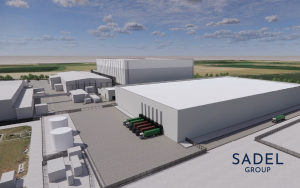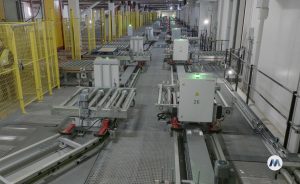
As part of Magnavale’s ESG strategy and their path towards a NET-ZERO future, the company has made substantial technological upgrades to their Scunthorpe cold store. Magnavale aim to be the greenest provider of temperature-controlled storage & added value services in the UK and combined with the development of their new store in Easton, Lincolnshire the improvement of their existing facilities puts Magnavale firmly on that path.
Frozen storage is vital for the modern food supply chain and while frozen food is more carbon efficient than chilled, there is still much that can be done to improve the overall carbon footprint of these supply chains.
Magnavale are extremely proud to announce that their refrigeration systems will receive a significant upgrade with help from the Industrial Energy Transformation Fund.
Cooling a refrigerated warehouse is accomplished by compressing refrigerant gas. As the gas is compressed the differential in pressure produces a cooling effect which allows the cold stores temperature to be reduced to the -18°C required to store food safely.
Magnavale’s upgrades focus on four key areas of improvement;
1) Refrigerant Gas – Unlike many cold stores in the UK that still use older, more harmful refrigerants, Magnavale Scunthorpe will utilise the most environmentally friendly refrigerant available which has a Global Warming Potential (GWP) of 0 and a Ozone Depletion Potential (ODP) of 0.
2) Compressors – By changing from older fixed speed compressor motors to new variable speed compressor motors efficiency can be optimised to reduce the energy input required.
3) Condensers – Once the gas is compressed, the heat is rejected from the system using the condensers. High efficiency condensers allow more accurate control of the pressure in the system, resulting in a much lower energy input.
4) Intelligent Operation and Monitoring – Automated monitoring, fault detection and optimisation from a de-centralised location makes it possible to continuously refine the operation of the system for greater and greater efficiency.
The result of the improvement will generate a carbon saving of 6,293 tonnes of CO2 over the verified life of the equipment. To give a sense of scale, the total saving is the equivalent of taking 1,500 average sized cars off the road or running 100 homes for a year.
Sadel Group
28 Avenue Pasteur,
L-2310 Luxembourg


